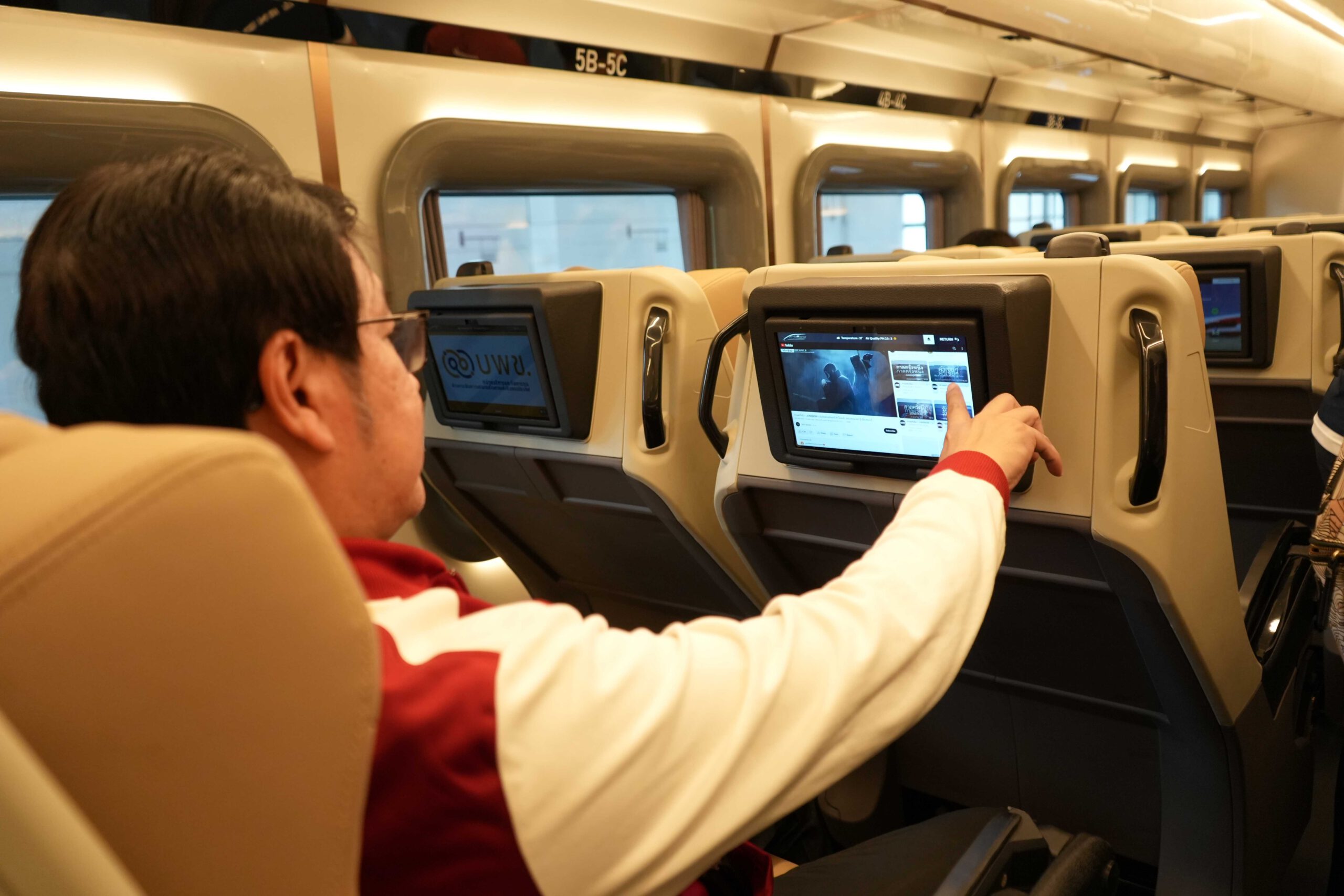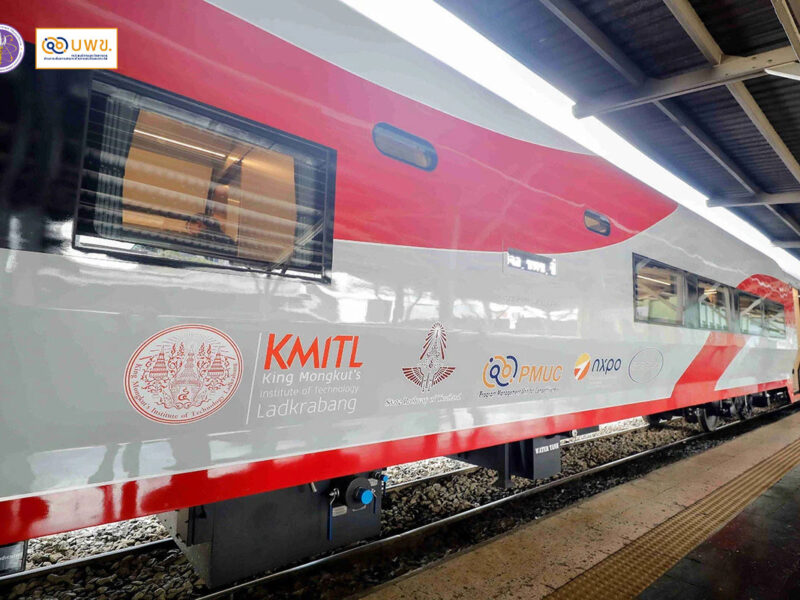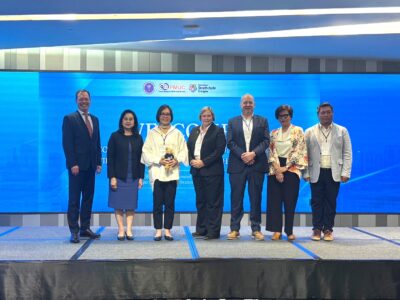
The Sirindhorn International Institute of Technology (SIIT), located at Thammasat University’s Rangsit campus, has unveiled a prototype passenger train under the name “Beyond Horizon.” This prototype is a luxurious and state-of-the-art passenger train designed and manufactured by Thai engineers using materials and industrial technologies within the country. It falls under the Luxury Class and Super-Luxury categories, setting the highest standards in the region. The project has received funding from the Thailand’s Board of Investment (BOI) to support the medium-distance railway service along rail lines spanning 200-500 kilometers and railway tourism to compete with low-cost airlines and private cars.
On July 25, 2023, the BOI, led by Professor Dr. Virasakdi Udomkitdecha, Chairman of the Mass Transit Systems Future Planning Working Group, visited to inspect the progress of the research and development project for the prototype passenger train, known as “Thai-made trains.” The research is a collaboration between SIIT researchers, SinoGen-Pin Petch Co., Ltd., and the State Railway of Thailand (SRT). The project is funded by BOI to develop passenger train carriages that emphasize research, development, and the incorporation of existing domestic technologies, aligning with the Thai First policy of the Ministry of Transport and government policies that encourage the use of domestically produced goods, especially for infrastructure projects that require trains with a minimum local content of 40%. It is estimated that over the next 20 years, there will be a demand for no fewer than 2,425 train carriages due to railway infrastructure investments made by the government in recent years. With an average value of 50 million baht per carriage, this amounts to a total market value for passenger train carriage production of around 100,000 million baht. Rolling stock is considered a vital component in the rail system’s value chain. Importing passenger trains and components made up to 80% of the total value of all goods in the rail system from 2015 to 2018. Therefore, it is crucial to accelerate the development of a supply chain with readiness for R&D (Research and Development) and tech localization to elevate Thailand’s rail transport industry.

Assoc. Prof. Dr. Somyot Kaitwanidvilai, Dean of the Faculty of Engineering, Chulalongkorn University, and Head of the research project, highlighted the strengths of the railway project. He stated, “This project focuses on research, development, and the consolidation of existing basic technologies within the country. Additionally, we aim to achieve a minimum of 40% domestic component usage in line with the Thai First policy of the government. With this project, we can create a prototype passenger train with a local content of 44.1%, including railway tracks and if we consider only the passenger carriage, the local content increases to 76%. We designed the entire train ourselves, drawing inspiration from business and first-class airplanes. The high-speed train has 25 seats, comprising 8 Super Luxury seats and 17 Luxury seats. Each seat is equipped with a personal entertainment screen and a food ordering service provided by robotic servers. Furthermore, the train features onboard toilets and complete amenities. The ticket price is equivalent to sleeper tickets offered by the State Railway of Thailand. In this project, we received funding and support from TPI Polene and SynoGen-Pin Petch. These private sector companies invested in the project. If we exclude the cost of equipment and research and development, the production cost of our train carriages is 32.4 million Baht, which is highly cost-effective compared to importing from abroad. We also reduced the train’s weight by using the Space Frame Modular Concept. The trains can reach speeds of up to 120 kilometers per hour. We have patented seven intellectual property works from this project, and more than ten companies in Thailand can manufacture and assemble them. This will help create an environmentally friendly rail transport manufacturing industry and strengthen the production chain.”

Regarding the project, Assoc. Prof. Dr. Weerasak Udomkitdecha, Chairman of the Future Mass Transit Systems Planning Committee of the State Railway of Thailand, emphasized the role of the PMUC in supporting the project. He said, “PMUC provided funding and support, with private sector participation, which confirms the strong potential of this project. Thai entrepreneurs are often hesitant to engage in research and development due to the required investment and associated risks. Therefore, PMUC’s involvement is crucial to support entrepreneurial research and development through collaboration with various parties, including researchers, university professors, and relevant agencies. Research and development are essential for enhancing our competitiveness on the global stage. This project serves as a good example of how collaboration can help bridge the gap between Thai knowledge and capabilities and those of others. Thai entrepreneurs lack opportunities and support, and PMUC, as a government agency, steps in to fill this gap. The committee and experts within PMUC have discussed and agreed that we need to diligently support Thai private enterprises. We must work as a united team, share responsibilities, and contribute collectively to achieve the project’s success.”

Mr. Anan Phonimdang, Deputy Governor of the State Railway of Thailand (SRT), has revealed the plan to deploy prototype trains in actual operations for the SRT. He stated, “SRT has been involved in this research project from the beginning. We’ve been involved since the initial design and the issue of passenger safety, which is crucial. The researchers have progressed well in this regard, and we are currently in the testing phase on real railway tracks for passenger service. If these tests are successful, we can implement the project in reality. Regarding the future train service plan, we may need to plan seating arrangements and configurations to suit different types of passengers, such as medium-distance and long-distance travelers. We may start by testing it with medium-distance passengers and observe how our designed train, which is a semi-sleeper, aligns with the roughly 500 km dual-track system. Additionally, the advantage of this train set is that it’s quiet since it doesn’t have an onboard diesel engine, which is in line with the concept SRT utilizes. Thus, this prototype can be adapted. This marks the first time we have been able to assemble a train set within the country, which is a significant step toward using local content.”


Mr. Methas Lertsetthakarn, Managing Director of the Sinogen-Pin Petch Co., Ltd., explained their reason for investing in this project, stating, “This project answers the pressing question of whether we can do it and believe that it’s not only Sinogen-Pin Petch that can achieve it. Thailand has many companies, both larger and smaller than Sinogen-Pin Petch, but with potential. What brought us into this project is the government’s investment in the rail system of over 100 billion baht, creating a need for more trains. However, we were forced to import trains as we couldn’t produce them ourselves, resulting in foreign countries reaping the most benefits from our railway industry. We felt we would miss opportunities if we didn’t do anything. Therefore, Sinogen-Pin Petch and a research team from the Science Park of Chulalongkorn University worked together on this project, which has received positive feedback from SRT. They have seen that Thailand has excellent researchers and professors who can collaborate and bring this project to a successful conclusion. The project has met global safety standards, and the experience has allowed us to prove that Thai entrepreneurs are capable of achieving such projects. This not only saves costs for the country but also strengthens the local industry. Neighboring countries like Myanmar, Vietnam, and Malaysia have been able to build their trains, while Thailand still has to import. This costs the country around 6 billion baht, and looking at it as an expense, it doesn’t stop with the purchase; there are also maintenance and repairs. We need knowledge and understanding, and this project allowed us to collaborate with a research team to create every part of the train. It means we can repair it ourselves, which will save costs in the long run. This project also enriched local entrepreneurs with valuable knowledge.”









The development of the prototype passenger train in this project is a significant starting point in Thailand’s effort for self-reliance, accomplished through cooperation between related parties. This includes support in the form of research budget from the Future Mobility group, PMUC, the Science, Research and Innovation fund (SRI), of the Ministry of Higher Education, Science, Research and Innovation, and in collaboration with Sinogen-Pin Petch Co., Ltd., working together with researchers from Chulalongkorn University’s Science and Technology Park, they were able to produce every part of the train. The success of this project will help Thailand save costs, estimated at approximately 50% when compared to importing goods from other countries. Additionally, it will elevate Thailand’s railway transport industry to produce technology products that meet user demands and global safety standards.








